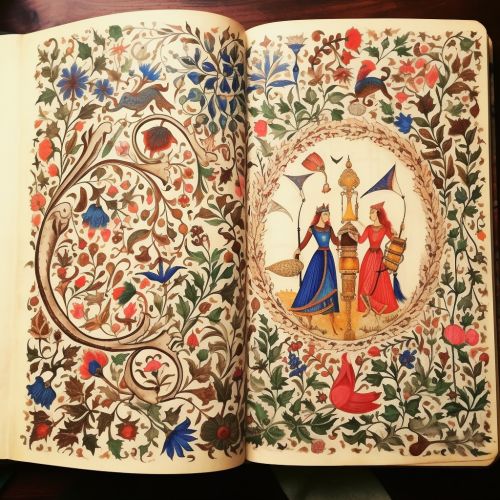Epic poetry
Overview
Epic poetry is a genre of poetry that originated in ancient times and continues to be a significant form of literary expression. These lengthy narrative works, often composed in verse, depict heroic deeds and adventures, usually of a nation's hero or heroes. The genre is characterized by its grand scope, formal language, and the use of various literary devices such as simile, metaphor, and epithet.


Historical Context
Epic poetry has its roots in the oral tradition of many ancient cultures, including those of the Greeks, Romans, and Mesopotamians. The earliest known epic poems, such as the Epic of Gilgamesh, were composed in the third millennium BCE. These works were often recited or sung by a bard or a chorus to an audience at public festivals or royal courts.
Characteristics of Epic Poetry
Epic poetry is distinguished by several key characteristics. These include a vast setting that often spans the known world and beyond, a heroic protagonist of high social status, the intervention of supernatural beings, extended formal speeches, and the use of recurrent thematic patterns and motifs.
Heroic Protagonist
The protagonist of an epic poem is typically a hero who embodies the values and ideals of his society. This hero is often of divine or semi-divine descent and possesses exceptional strength, intelligence, or moral virtue.
Vast Setting
Epic poems often feature a vast geographical setting, encompassing multiple nations, the world, or even the universe. This broad scope allows for a wide range of adventures and challenges for the hero.
Supernatural Elements
The intervention of gods or other supernatural beings is a common feature of epic poetry. These beings often aid or hinder the hero, reflecting the belief in divine intervention in human affairs.
Formal Speeches and Dialogues
Epic poems frequently include extended formal speeches or dialogues, which serve to express the characters' thoughts and emotions, advance the plot, or convey moral or philosophical ideas.
Thematic Patterns and Motifs
Epic poetry often employs recurrent thematic patterns or motifs, such as the hero's journey, the epic battle, or the quest for glory. These patterns serve to structure the narrative and provide a sense of unity and coherence.
Major Works
There are many notable works of epic poetry from various cultures and periods. These include the Iliad and the Odyssey by Homer, the Aeneid by Virgil, the Divine Comedy by Dante Alighieri, and Paradise Lost by John Milton.
Modern Epic Poetry
While the traditional form of epic poetry has largely fallen out of favor in modern times, elements of the genre continue to influence contemporary literature and film. For example, J.R.R. Tolkien's The Lord of the Rings series can be seen as a modern epic, with its heroic characters, vast setting, and grand narrative.
